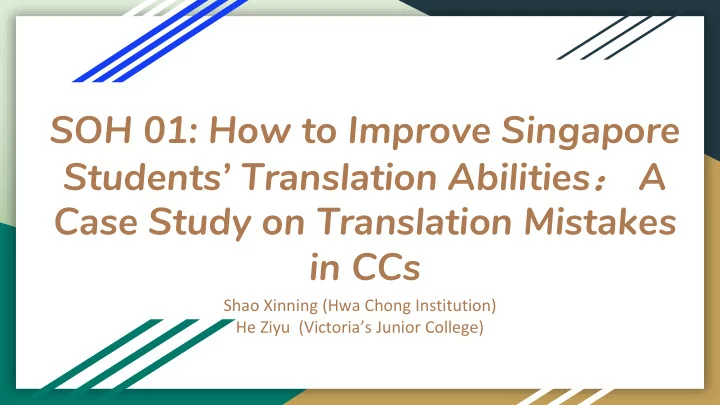

SOH 01: How to Improve Singapore Students’ Translation Abilities : A Case Study on Translation Mistakes in CCs Shao Xinning (Hwa Chong Institution) He Ziyu (Victoria’s Junior College)
Aims 1. Find out the cause 2. Propose solutions 3. Improve language environment → improve students’ translation abilities
Significance of our study
1. Reduce misinformation conveyed to the people
2. Importance of translation skills in the globalized world
Hard power + soft power
Methodology - Observation and Interview Eight CCs are selected for field work, namely, Ang Mo Kio, Bishan, Bishan North, Bedok, Cheng San, Toa Payoh Central, Siglap South, and Marine Parade Community Club.
Methodology - Obtain Information on: - production process of translated materials - possible reasons for mistakes - CC’s proposed response to these mistakes
Methodology - Analysis 1. Mistake Categorization 2. Reasons behind the Mistakes 3. Identify Gaps
Categorization of mistakes
Mistakes: Grammatical/Comm on usage perspective
1. Wrong grammatical categories 2. Inappropriate word choices 3. Wrong homophones
1. Inappropriate Word Choices
2. Wrong Homophones
Mistakes: Translator’s perspective
0. Translator‘s lack of linguistic abilities
1. Wrong cultural context 2. Creating new combination of words 3. Customary usage of wrong translations 4. Misuse of online translators 5. Defamiliarization of mandarin in the local context
1. Wrong Cultural Context
2. Misuse of online translators
3. Defamiliarization of mandarin in the local context 老人 — - 乐龄人士 集市 — - 巴刹 乡村 — - 甘榜
Proposed Solutions
Parties involved in CC’s translation process commissioner Source text producer CC Initiator CC/contractors CC Target text producer Target text CC: in-house Target text user receiver staff CC residents
Solution 1. (TT-Producing Stage) Work Bond with Professional Translators - Translation is done by CC staff - Translation agency helps vet - win-win Relationship
Solution 2. (TT-Producing Stage) Centralized Training for Staff Translator - Learn Necessary Linguistic Skills - Obtain Cultural Literacy - Analyze Translation Errors
Solution 3. (TT-Receiving Stage) Rewarding System for Residents - Residents Rarely Report - Reporting through social media is a more convenient way. - Give Rewards to Incentivize
Limitations
How to create a low-tolerance atmosphere for translation errors: - psychology and sociology
Extensions + Conclusion
Problems Faced: - Gaps in Language Abilities - Meagre Exposure to Translation Approach: Short-Term Organisational Help for CCs + Long-Term Bilingual Education = Improved Language Environment and Translation Ability
Thank you!
Q&A
Recommend
More recommend